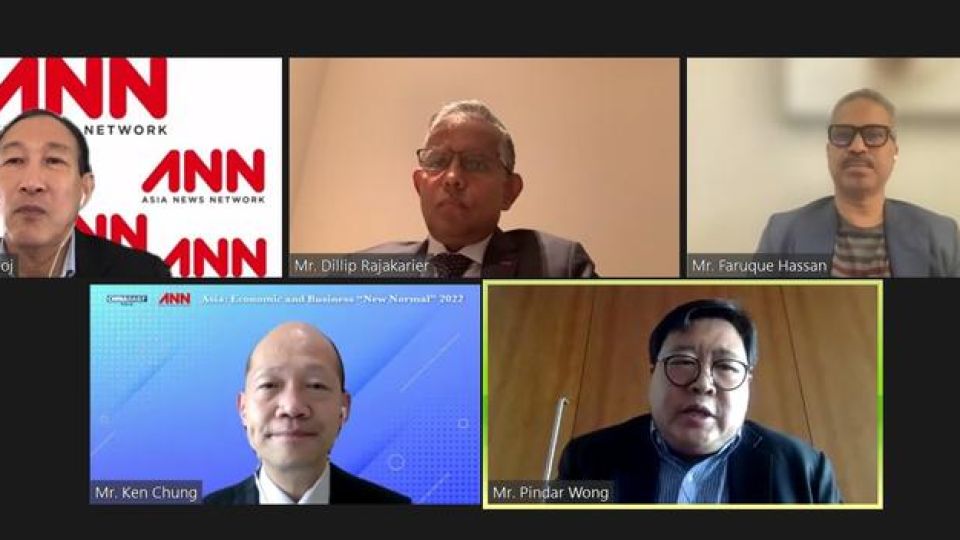December 15, 2021
The COVID-19 pandemic has turned the world on its head, but the crisis has revealed the adaptability, flexibility and resilience of industries to transform challenges into opportunities. Practitioners from the logistics, tourism, fashion and retail industries opened a dialogue on Tuesday, sharing the “street smarts” that enabled them to survive this fraught time.
At the forum “Asia: Economic and Business ‘New Normal’ 2022”, co-hosted by the China Daily Leadership Roundtable and the Asian News Network, an alliance of 23 national media in 20 Asian countries, speakers celebrated the high adaptability shown by industries that are riding out the storm.
The COVID-induced disruption to the global supply chain has left an estimated several hundred thousand containers from China en route to the United States and Europe detained for extended periods, according to Ken Chung Hung-hing, chairman of the Chamber of Hong Kong Logistics Industry. This has driven up the cost of container shipping 10 times, from $2,000 prior to the pandemic to $20,000. As a result, companies have difficulty attracting enough customers for the shipping, he said.
There is also an imbalance of need and supply in the trading process, Chung said. The disrupted supply chain renders some natural resources and necessary ingredients in the production or trading process inaccessible, leading to a shortage in the supply of commodities to consumers. Trading protectionism in many economies has compounded the challenges facing the industry, he said.
An inspection of the pricing index for container shipping reveals a dramatic increase in the past two years since the pandemic. Some would argue that the increase has allowed shipping companies to reap high profits. But Chung contends that it may not necessarily be the case as large shipping companies have to make risk management assessments in such volatile situations, saying, “They already declared they’d frozen the high price a month or two before, as they had to manage the risks and couldn’t afford to let the price go up to infinity.”

Azam Khan (left), multimedia anchor of China Daily Hong Kong, and DJ Clark, multimedia director of China Daily Asia Pacific, join the webinar via a remote link on Monday. (EDMOND TANG / CHINA DAILY)
Dillip Rajakarier, CEO of Minor Hotels, a Bangkok-based hospitality company that operates 500 hotels worldwide, said that the COVID-19 pandemic has created a tsunami in the global travel industry because of the de facto halt in global tourism.
“It’s been very challenging for the industry, due to the travel restrictions and quarantine arrangements imposed by different countries because of COVID-19,” he said.
The epidemic has also changed global consumers’ travel habits and preferences as they have focused more on hygiene and health, Rajakarier noted. “Guests are paying more attention to health and wellness (factors) such as boosting immunity. They want to make sure that health and wellness are being taken good care of.”
Garment manufacturing is the backbone of Bangladesh’s economy, and small and medium-sized enterprises in the fashion industry have suffered a shocking blow, particularly in sourcing and exporting to some markets, said Faruque Hassan, president of the Bangladesh Garment Manufacturers and Exporters Association.
Against all the odds, Hassan said that fashion sectors in Bangladesh have ventured out of their comfort zone, making immediate adaptations to the sticky patch they found themselves in, including changing tactics in the manufacturing process, going digital and embracing e-commerce, expanding the production of non-cotton and value-added items. The adaptive strategies have seen the fashion sector back on its feet in the past few months, Hassan said.
Looking forward to 2022, Rajakarier is optimistic on global tourism, saying, “International traveling will rebound. Traveling will come back quite strongly next year when COVID-19 becomes a flu, due to the pent-up demand, which will gradually ease.”
Pindar Wong, blockchain pundit and chairman of internet financial infrastructure consultancy VeriFi (Hong Kong), said that besides affecting consumers’ behavior, the pandemic has altered producers or businesses’ way of operation, forcing them to shift to a more digital-savvy model.
Wong said he predicted the recent crypto frenzy amid accelerated digitalization would broaden the business turf for intellectual property practices. “There’re a lot of experiments going on around crypto such as metaverse … but the real reality is that there’s a competition of money,” he noted. “I think what it really does is it’s changing the way we do business with intellectual property.”
While he is upbeat about the prospect of the trading industry regaining its vitality in the coming years, Chung takes a cautiously positive outlook on the time needed, saying, “The issues can’t be resolved anytime soon,” as it takes time to let the prices of container shipping cool down and the supply catch up with the demand. “My expectation (for the recovery) is in the second or third quarter of the coming year,” Chung said.


